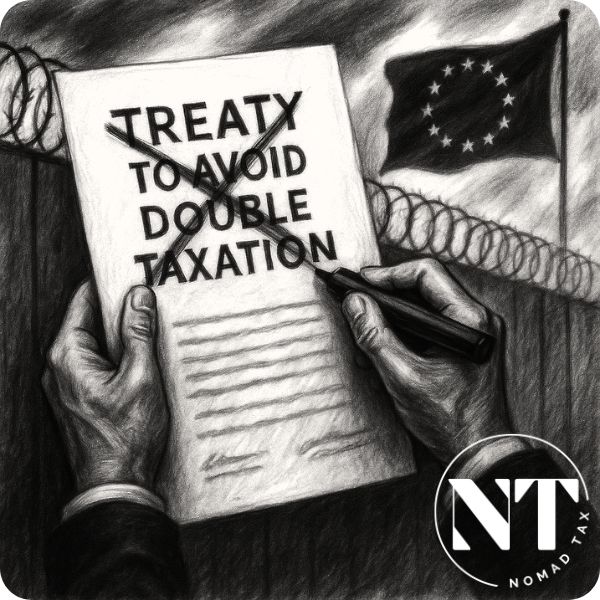It’s no longer enough to stay quiet and pay. Now, European governments want to stop you from leaving. For years, “fiscal solidarity” was the price of living in society, and many accepted it. They paid, they stayed quiet, they supported the system. But if you created a business, accumulated assets, or simply prospered, to the State you’re no longer a citizen: you’re an asset. This is the stark reality of Tax persecution in Europe that many experience, where governments seek to squeeze you, even if you decide to leave.
This “new” paradigm resembles modern feudalism: citizens are tax subjects who must pay to leave the jurisdiction. Wealth, even unrealized wealth, comes under suspicion. And whoever tries to flee does so knowing their assets can be held hostage.
The name of this doctrine? Exit Tax. An invisible wall, a fiscal punishment for the simple act of wanting to move. Not for what you did, but for what you’re about to do: escape the system without leaving a substantial “tip.”
In this blog, we’ll reveal how European governments plan to penalize your freedom of movement, a punishment for the instinct of freedom and the mere decision to seek new horizons. You’ll discover why the threat of Tax fines for changing residence and the application of Exit Tax are no longer a distant future, but a reality affecting digital entrepreneurs, professionals, and nomads. We’ll analyze When Exit Tax applies, how it impacts your assets, and why understanding these dynamics is crucial to protect your financial freedom.

Indice del artículo
What is Exit Tax and When Exit Tax applies?
Freedom of movement and autonomy over one’s own assets are fundamental pillars for many entrepreneurs and professionals seeking new opportunities outside their countries of origin. However, in the current tax landscape, Europe has begun to implement a measure that challenges these principles: the Exit Tax, or exit tax. This is not a minor levy, but an increasingly common tool in the growing Tax persecution in Europe, designed to penalize those who decide to change their tax residence. For those looking to know How to avoid Exit Tax and potential Tax fines for changing residence, understanding this concept is the first step.
Latent Gain: The Legal Excuse to Charge You for Leaving
The scope of Exit Tax is not limited to large fortunes or giant corporations. Increasingly, several European countries are designing a generalized Exit Tax that can affect digital entrepreneurs, freelancers, and professionals with small or medium savings. The objective has evolved: it is no longer just about collecting from the wealthy, but about setting a precedent for anyone who decides to leave, marking a path of punishment for the instinct of freedom and more broadly clarifying When Exit Tax applies.
This concept has precedents in other economies. The United States, for example, has for years applied a comprehensive exit tax to those who renounce their citizenship, charging for unrealized gains if their assets exceed a certain threshold. But in addition, it imposes a fixed fee of $2,350 simply for renouncing the passport. This practice not only has an economic cost: it exposes the individual to global reports under FATCA, the automatic tax information exchange system that forces banks worldwide to report U.S. citizens.
Europe has begun to replicate this model, adapting it to its context, but maintaining the same “legal cage” logic in the form of a democracy.
Exit Tax: The Tax Trap When Emigrating
In essence, the Exit Tax is a tax that levies latent gains, that is, the increase in value of certain assets, at the moment a person or company changes their tax residence from one country to another. The tax administration of the country of origin interprets this change as a fictitious sale of all assets, even if the taxpayer has not carried out any transaction. The aim is to ensure taxation on wealth generated under the laws of that jurisdiction before it “escapes” its reach.
In other words, Nomad, when a person decides to move, the State interprets it as if all those assets had been sold at the time of departure. Therefore, it demands payment of taxes on that estimated gain, even if the taxpayer has not received a single euro from an actual sale. This turns the right to emigrate into a conditioned privilege, as the freedom to seek other horizons is subject to paying a fiscal “penalty” for the wealth the State considers “its own.”

Tax Persecution in Europe: Practical Cases and Their Impact
The theory of Exit Tax materializes in concrete cases that reveal the true magnitude of Tax persecution in Europe. Governments, desperate to retain the tax base and curb capital flight, are implementing increasingly restrictive measures. The examples of Norway, Spain, and France illustrate how this doctrine is spreading and why it’s vital to understand When Exit Tax applies in each context to avoid potential Tax fines for changing residence. To know How to avoid Exit Tax, one must first understand its scope.
Norway: The Exit Tax Laboratory in Europe
Norway was one of the first European countries to tighten its fiscal policy. In 2022, it raised the wealth tax by 55% and increased the burden on dividends, leading to the flight of 82 billionaires with assets exceeding $4.3 billion. The result? A fiscal hole of almost $450 million annually, compared to the $146 million it aimed to collect.
Far from backing down, the country doubled down. Since March 2024, it applies an Exit Tax of 37.84% on latent gains from shares and investment accounts if the taxpayer moves. There’s an exemption of €270,000, but if you return to Norway within 12 years, the tax is reimbursed. It’s not just about collection: it’s a clear message against mobility.
The 2025 reform tightened the noose even further: it limited exemptions to EEA emigrants, extended the tax to savings accounts in shares and capital insurance, and set an automatic 70% withholding on dividends after departure. Additionally, it eliminated tax credits for foreign payments. Tax persecution in Europe is no longer theory—Norway turned it into norm.
Spain: The Exit Tax and Its Conditions
Spain is not far behind in Tax persecution in Europe. In 2022, the government reintroduced a national wealth tax, seeking to prevent regions like Madrid from granting a 100% bonus on it. The result was the opposite of what was expected: over 1,000 large fortunes disappeared from the tax radar, adjusting their residence or structure. Between 2023 and 2024, collection plummeted by 95%. The system, instead of strengthening, was drained.
In response, a tool that was already latent gained strength: the Spanish Exit Tax, regulated in article 95 bis of the Personal Income Tax Law. This tax is activated if two simultaneous conditions are met: having been a tax resident in Spain for at least 10 of the last 15 years, and holding financial interests exceeding 1 million euros, or at least 25% participation in a company valued over 4 million. If these conditions are met, the tax departure is interpreted as a fictitious sale of all assets, taxing unrealized gains.
Although it’s possible to claim a refund if you return without having sold, the process is complex and bureaucratic. Therefore, understanding When Exit Tax applies in Spain and How to avoid Tax fines for changing residence is key. The logic is clear: penalize those who prosper and decide to leave, with a legal net designed to hold assets hostage.
France: A Perpetual Exit Tax?
France, historically known for its tax pressure, has gone a step further in Tax persecution in Europe. In 2024, the Finance Committee proposed a nationality-based taxation model. This initiative suggests that if a person has been a resident in France for at least 3 of the last 10 years and moves to a low-tax country, they would continue to pay taxes… simply for being French.
This model is a kind of Perpetual Exit Tax, reminiscent of the U.S. system where citizenship-based taxation continues even if one does not live in the country. Although the French proposal has not yet been approved, it raises concerns and underscores the desperation of European states to retain the tax base, even at the expense of freedom of movement. Understanding the evolution of these proposals is crucial for anyone considering How to avoid Exit Tax and future Tax fines for changing residence.
Beyond Known Cases: Countries Moving Towards a Generalized Exit Tax
- In Poland, an Exit Tax was introduced in August 2023 that applies to individuals with “fictitious gains,” meaning without the need for an actual sale of assets. This tax will be enforceable starting in 2025 and expands the scope of fiscal punishment even to taxpayers without complex business structures.
- The Netherlands, for its part, has already greenlit a parliamentary proposal to introduce an exit charge applicable during the first five years after changing residence. The measure seeks to prevent “aggressive optimization” by mobile citizens, but in practice, it functions as an invisible tax wall.
- Germany and Portugal have also joined the trend. Although their proposals are not yet fully implemented, both countries are debating schemes that allow taxing latent gains when a taxpayer changes countries. The narrative is always the same: “protect the national tax base,” although the real impact is to discourage mobility and penalize legitimate financial planning.

Agreements for the Avoidance of Double Taxation (CDI): A Shield Against Exit Tax?
Facing the growing Tax persecution in Europe and the latent threat of Exit Tax, many wonder if Agreements for the Avoidance of Double Taxation (CDI) offer protection. These treaties, designed to avoid double taxation on the same income or assets, seem like a logical solution. However, their effectiveness against exit taxes is limited, which is crucial to understand to avoid Tax fines for changing residence and to know How to avoid Exit Tax effectively.
Limitations of CDIs Regarding Unrealized Gains
Most CDIs are based on the OECD Model Tax Convention and assign taxing rights over capital gains to the State of residence of the alienator. The conflict with Exit Tax lies in its nature: it taxes unrealized gains at the time of departure, meaning the latent value of assets that haven’t yet been sold.
CDIs focus on effectively realized gains. When a country applies an Exit Tax, it’s imputing a fictitious sale. National laws regulating Exit Tax often prioritize protecting the tax base of the departing country, limiting the ability of CDIs to mitigate this levy. CDI mitigation mechanisms (exemption or tax credit) rarely apply automatically and directly to Exit Tax, given the temporal difference between the tax payment and the actual sale of the asset. Therefore, to know When Exit Tax applies and how it interacts with CDIs, a specific analysis of each treaty is required.
The Role of European Anti-Tax Avoidance Directives
The European Union has strengthened the legitimacy of national Exit Taxes through the Anti-Tax Avoidance Directives (ATAD I and ATAD II), fully in force in 2025. These directives establish minimum rules against tax avoidance and allow countries to tax latent gains on assets transferred out of their tax territory.
This means that European directives, far from being an obstacle, support national Exit Taxes, provided certain proportionality conditions are met. The conclusion is clear: while CDIs are valuable tools, their capacity as a “shield” against Exit Tax is limited. The key for those looking for How to avoid Exit Tax and potential Tax fines for changing residence lies in advanced tax planning that considers national legislation, European directives, and a deep understanding of When Exit Tax applies in each jurisdiction.

Strategies Against Tax Persecution in Europe: Beyond Resistance
Given the growing pressure and Tax persecution in Europe and the omnipresence of Exit Tax, passively resisting is no longer a viable option for digital nomads, entrepreneurs, and professionals. The key is not to defy the system without knowledge, but to engage in strategic and legal planning that allows for the protection of assets and freedom of movement. Understanding When Exit Tax applies and its implications is the first step; the next is to act intelligently.
How to Protect Your Assets and Your Freedom of Movement
Protecting your assets and your freedom of movement in this scenario involves a series of proactive and well-informed actions, always hand-in-hand with experts:
- Planning for Tax Residence Change: The severance of fiscal ties with the country of origin must be impeccable. It’s not enough to simply change your address; you must meet criteria for days of presence and, crucially, demonstrate that your “center of vital interests” (economic and personal) no longer resides in the departing country. An error here can lead to severe Tax fines for changing residence.
- Analysis of Departure Timing: If Exit Tax is unavoidable, the timing of your departure can influence its amount. Planning the sale or restructuring of assets before a move can be a strategy to manage the tax impact.
- Evaluation of Legal Structures: For entrepreneurs, choosing the jurisdiction and legal structure of the company is fundamental. Opting for countries with more favorable tax frameworks for online businesses, provided a real presence and management are established, is a way to optimize the overall tax burden and to know How to avoid Exit Tax in the future.
The Importance of Specialized Professional Advice
Expert advice is crucial for:
- Evaluating the real impact of Exit Tax.
- Ensuring regulatory compliance.
- Identifying fiscally efficient jurisdictions.
- Planning succession and asset protection.
In an environment where the State perceives your assets as its own, investing in advice is a vital defense against a system that seeks to imprison talent rather than retain it.



